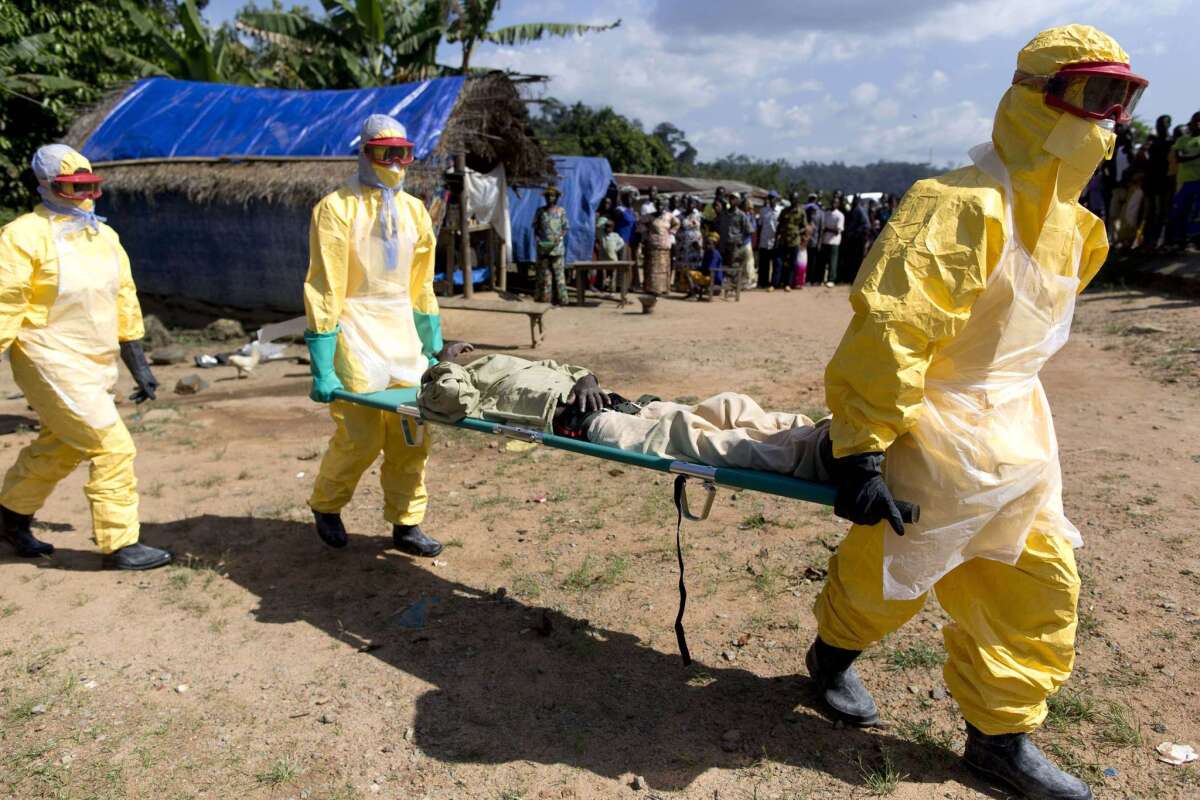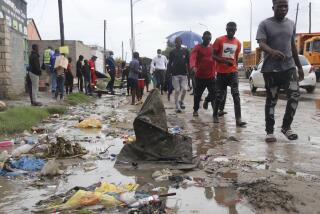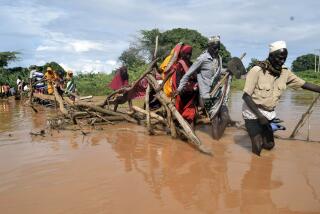Cases of Ebola recede in West Africa, but fears of recurrence remain

In November 2014, health workers in protective suits carry a patient suspected of having Ebola to a treatment center in Guinea.
Ebola, which wiped out families, orphaned children and devastated West African economies, is finally retreating more than 18 months after the epidemic began, with Sierra Leona expected to be free of the disease in the coming months and a United Nations emergency response center due to shut down.
Guinea, the first country to be hit by the world’s worst Ebola outbreak, is expected to be the last to be declared free of the disease. The country currently is reporting between seven and 27 new cases a week.
Sierra Leone has had between two and 12 new cases a week since late April. Liberia was declared Ebola free last month.
Peter Graaff, head of the U.N. center, said the Ghanaian government played a key role in overcoming the disease by allowing the mission to be established last September in the capital, Accra. Even more important was its decision to allow flights to continue into the three neighboring countries worst hit by the disease.
Ghana’s move came at a time when most African countries had stopped flights to Liberia, making it difficult for health and emergency workers to get to the region.
Ghanaian President Dramani Mahama showed “extraordinary leadership and solidarity,” Graaff said.
“He made Ghana the only open gateway to Guinea, Liberia and Sierra Leone, thus allowing the movement of thousands of Ebola responders and medical and essential supplies when they were most needed,” Graaff said. “Without Ghana’s open doors and hearts at the most critical juncture, we would not be reaching the tail end of the Ebola epidemic now.”
As the disease recedes, the international focus has switched to steps to rebuild the economies and health systems in the countries hardest hit.
The disease killed more than 11,000 people.
The presidents of Sierra Leone, Ernest Bai Koroma, and Guinea, Alpha Conde, recently visited the border area between the two countries and announced tough measures to prevent the disease from skipping across the line, the U.N. reported Tuesday.
The border region has continued to record new cases and to be the source of cases that emerge elsewhere in the countries.
Security forces will enforce Ebola quarantines in the border area, Conde said, warning that anyone who attacked health workers and others addressing the Ebola crisis would be prosecuted.
Guinea’s response was hampered by the extreme public distrust of health and government workers trying to eradicate the disease. In September, eight members of a team of local officials, health workers and journalists were killed with machetes and clubs by villagers. In some areas there were riots amid rumors that health workers were spreading the disease.
The World Health Organization has identified unsafe burials and the traditional washing of corpses as one reason the epidemic has remained so resilient in Guinea and Liberia, warning that the disease will remain until the practices are stopped.
Conde warned that anyone who tried to move the bodies of Ebola victims or those sickened with the disease also would be prosecuted. Hospitals that failed to follow the correct procedures would also face action, he warned.
The U.N. says that containing the virus in the region is the key to reaching zero transmission. U.N. Secretary-General Ban Ki-moon will convene an international conference in New York on July 10 in an effort to ensure that the epidemic does not recur.
Follow @robyndixon_LAT on Twitter for news out of Africa
More to Read
Start your day right
Sign up for Essential California for news, features and recommendations from the L.A. Times and beyond in your inbox six days a week.
You may occasionally receive promotional content from the Los Angeles Times.






